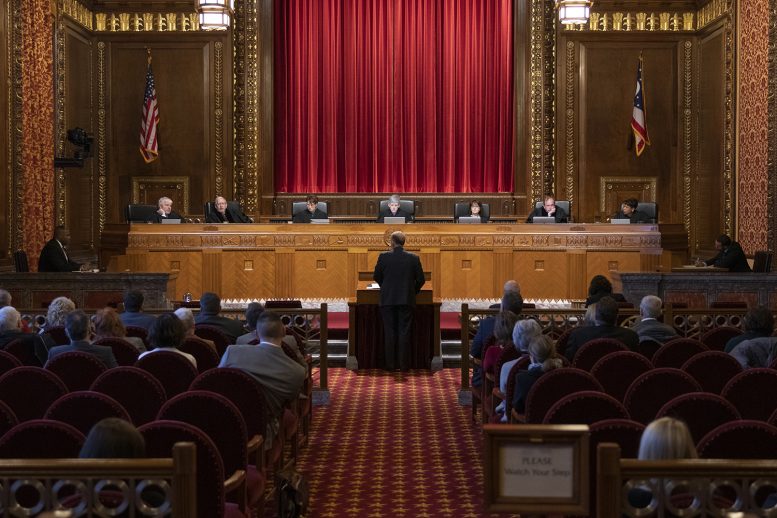A change to Ohio’s ballot rules could impact key Supreme Court races in 2022 and influence the leaning of the state’s highest court for years to come.
Gov. Mike DeWine signed a bill into law Thursday that will list candidates’ party affiliations on ballots for certain judicial races. This will include races for the Ohio Supreme Court as well as the dozen appellate court districts.
Ohio’s election system is currently unique in that judicial candidates campaign in partisan primaries, but the November General Election lists them without party affiliation. This is ostensibly to promote judicial independence, but is thought to contribute to significant ballot “drop off” — more than 1 million Ohio voters in 2020 left the two Supreme Court races blank.
Republican supporters of adding ballot party affiliation say this change is necessary to provide more information to voters and also because the campaign trail already features partisan spending, endorsements and advertising.
“In reality, the process of electing a judge is already simply partisan in nature,” said Rep. D.J. Swearingen of Huron, who introduced legislation to make this change. Lawmakers ultimately approved an identical bill originating from the Ohio Senate, which was sponsored by State Sen. Theresa Gavarone, R-Bowling Green and State Sen. Jerry Cirino, R-Kirtland.
“This bill is sorely needed and long overdue,” Swearingen added.

Democrats joined organizations like the Ohio State Bar Association, Ohio Courts of Appeals Judges Association and Ohio Judicial Conference in opposition. The executive director of the latter group, former Ohio Supreme Court Justice Paul Pfeifer, told lawmakers that party affiliation is “wholly irrelevant to the work of a judge” and should not be included on ballots. Pfeifer blames the voting drop off to “broader unfamiliarity with judicial candidates” rather than political party confusion in the ballot box.
Pfeifer and other opponents point to the Ohio Code of Judicial Conduct, which prohibits candidates from any political activity “inconsistent with the independence, integrity, or impartiality of the judiciary.”
“Judges are currently not even allowed to make statements implying how they would rule on a case before them under the code of judicial conduct,” said state Rep. Bride Rose Sweeney, D-Cleveland. “Then why would we further continue to require a party label that would make similar implications to voters?”
Critics like state Rep. Stephanie Howse of Cleveland believe this change is only being sought for political purposes. Democrats have won three of the past four Ohio Supreme Court elections (held in 2018 and 2020), narrowing the Republican majority on the court to 4-3. GOP candidates have fared well in other statewide races where party affiliations are listed on the ballot.
“I know we talked about being honest with voters, so let’s just be real,” Howse said. “Be a straight-shooter. Y’all scared. It’s cool, because Democrats are absolutely coming for the Ohio Supreme Court in ‘22.”
Another Republican sponsor of the legislation, Rep. Brian Stewart of Ashville, pushed back against this line of attack and noted his policy support predates the recent election results.
Stewart and Swearingen both highlighted earlier support for this change from Democrats.
The Ohio Democratic Party, in fact, once waged a legal battle seeking to include party affiliation on judicial ballots and viewed the forced nonpartisan labelling as being unconstitutional. The party lost this fight, and now a decade later sees its lawmakers fighting against such a change.
Just 18 months ago, Democratic state Rep. Michael Skindell sponsored legislation that would have added party affiliation to ballots unless a judicial candidate expressly opted out of having it listed. Skindell unsuccessfully ran for the Ohio Supreme Court in 2010 and his bipartisan legislation was cosponsored by Democratic state Rep. Michael O’Brien of Warren.
Both Skindell and O’Brien voted against the more recent legislation put forward by Republicans.
Democrats also accused the bill sponsors of “cherry picking” some judicial races to include while candidates for lower courts will continue to be listed on ballots without party affiliation.

Swearingen said this was intentional.
“When we see a Super PAC or Eric Holder come in for a Municipal Court judge, let me know about it, because we’ll put them in the next bill,” he said, referring to the former Democratic attorney general who campaigned for Ohio Supreme Court candidates in 2020.
“We don’t see nearly the levels of fundraising and, quite frankly, national politics that occur at the Ohio Supreme Court levels and the appellate appeals levels that we would at the local level,” Swearingen argued.
The change could have an impact on an election involving the governor’s son, Patrick DeWine, a Republican serving on the Ohio Supreme Court.
The younger DeWine has announced plans to campaign for chief justice in 2022 to replace sitting Chief Justice Maureen O’Connor, who is forced to retire due to mandatory age restrictions.
He may end up facing Justice Jennifer Brunner, a Democrat elected to the court in 2020 who also jumped into the chief justice race.
Said Brunner about the possible ballot change, “Frankly, my opinion is, just tell me the rules and I’ll run.”
***
Also from Ohio Capital Journal:
DeWine signs bill blocking Ohio cities from banning natural gas
Gov. Mike DeWine signed into state law Thursday legislation that blocks cities or counties from banning natural gas or propane hookups to decarbonize new buildings.
This makes Ohio one of 19 states that have either passed what’s known as a natural gas “preemption” bill into law or will do so soon upon gubernatorial approval, according to a running count from the Natural Resources Defense Council.
The legislation, backed by fossil industries like the Ohio Oil and Gas Association and the Ohio Chemistry Technology Council, would block any city or county from issuing any law or zoning code that “limits, prohibits, or prevents” people and businesses from obtaining natural gas or propane service.
A small but growing list of progressive cities around the country have passed legislation banning new buildings from obtaining natural gas hookups in an effort to cut down on greenhouse gas emissions that contribute to climate change.
However, no Ohio cities have yet done so. House Bill 201, which is cosponsored by State Rep. Haraz Ghanbari, R-Perrysburg, locks this dynamic into state law. READ MORE
Step Up to Quality remains in budget, low-income care boosted; DeWine defends abortion restrictions
Child care in the state will still have one standard-making process that was nearly cut from the state budget, while other investments in broadband and publicly-funded child care come with praise from Ohio advocates.
Leaders of child care facilities and policy advocates in the state were worried that Step Up to Quality, the state’s standard-monitoring system and ranking method for licensed child care programs, would be eliminated after a Senate revision of the budget noted that as a goal. The system was ultimately retained in the final budget version signed by Gov. Mike DeWine into law.
Also included in the budget, financial eligibility for publicly-funded child care (PFCC) was widened for Ohio children, including those with special needs.
“We commend our legislators for recognizing Ohio’s inadequate child care system and providing our families with the opportunity to care for their children, regardless of race, income or ZIP code,” said Tami Lunan, of the nonprofit Ohio Organizing Collaborative. READ MORE





